AMD eBulletin – 19 December 2024
A message from your President
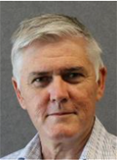
G’day and kia ora
We are already at the end of 2024. It’s hard to believe how quickly the year has flown by. A heartfelt thank you to all Adult Medicine Division Fellows and trainees for your ongoing commitment to our College motto Hominum servire saluti (to serve the health of our people).
I would also like to acknowledge the work of our AMD Council members throughout 2024 as we have progressed key components of our work plan including member wellbeing, member engagement, and growing the physician leader. Over the past few months, we have been working closely with our colleagues in the Member Health and Wellbeing Committee to identify ways we can support some of our most vulnerable colleagues, particularly those who are in remote areas, small private practice settings, or otherwise struggling with limited collegiate support networks.
Throughout the year, we have also been advocating behind the scenes on workforce and training issues in a number of arenas. We know there is still much to be done in these areas, and we will continue to progress these in 2025.
AMD Leadership and Management Workshop
One of our key achievements this year was the recent AMD Leadership Workshop on 16 and 17 November in Sydney, which brought together a dynamic group of early to mid-career Fellows and advanced trainees. The workshop focused on equipping attendees with the leadership skills necessary for a clinical environment, exploring a wide range of relevant topics. I would like to extend my heartfelt thanks to our speakers, who generously dedicated their weekend to delivering valuable presentations on subjects such as the Australian healthcare system, personal leadership journeys, clinical governance, recruitment, communication, kindness, self-care, and navigating the media landscape, among others.
A special thank you goes to Professor Brian Wood and Dr Arnagretta Hunter, who took the lead in shaping and delivering the program for this workshop, and to Penny Maber and Phoebe Kim from the College for their great coordination skills.
This was the second workshop of its kind that AMD has delivered, and the feedback we received from attendees indicates it was a resounding success. Supporting the growth and development of physician leaders remains a central focus of our AMD work plan, so I, and my colleagues on the AMD Executive Committee, look forward to hosting more activities in 2025 that are both collegial and engaging.
Thank you to Chapters and Specialty Societies
As always, I am grateful for the connections and support from our AMD-affiliated specialty societies, and in particular their representatives on AMD Council who support all the work we do. I would also like to extend a special thank you to the three Chapters and their Presidents who are nearing the end of their terms in 2025:
- Professor Adrian Dunlop, President of the Australasian Chapter of Addiction Medicine
- Associate Professor Peter Poon, President of the Australasian Chapter of Palliative Medicine
- Dr Massimo Giola, President of the Australasian Chapter of Sexual Health Medicine.
As you will see in the Chapter Presidents’ updates below, Chapter committee members have been working tirelessly throughout the year to advocate on key issues and to prepare various events, workshops, and conferences.
2025
Looking forward to 2025, AMD Council and the Executive Committee plan to continue advocating for member wellbeing initiatives, meaningful representation for First Nations AMD Fellows within the College, and continuing to support and develop physician leadership skills. In May, I will be coming to the end of my term as AMD President and I look forward to welcoming our current President-elect, Professor Brian Wood, into the role.
As we head into the holiday season, I wish you a restful and joyful time with loved ones. While we often put our patients' needs ahead of our own, take this opportunity to recharge and prioritise your wellbeing and family.
If you have any feedback, questions, or comments for me or the AMD Council, please reach out through our secretariat at adult.med@racp.edu.au.
Professor Graeme Maguire
President
Adult Medicine Division
AChSHM President’s Post

Hello and kia ora,
2025 ASM and ATM
I am pleased to announce that registrations are now open for the 2025 AChSHM Annual Scientific Meeting (ASM) on Saturday, 15 March and 2025 Annual Trainee Meeting (ATM), on Friday, 14 March. Both events will be held in person at the RACP Sydney office (1 O'Connell St, Sydney).
The 2025 ASM Organising Committee is led by Dr Stephanie Bond, with support from the following Committee members, including myself:
- Dr Massimo Giola (Aotearoa NZ), AChSHM President
- Clinical Professor Louise Owen (TAS/NSW), AChSHM President-elect
- Associate Professor Jason Ong (VIC)
- Dr Evelyn Huang (VIC)
- Dr Lucy Donovan (VIC)
- Dr Miranda Howlett (WA)
- Dr Rosalind Foster (NSW)
- Dr Rose Forster (Aotearoa NZ)
- Dr Yen Li Lim (NSW).
The Jan Edwards Prize for best research project presentation and the Penelope Lowe Prize for best case study presentation will be presented during the AChSHM ASM.
Further program details are available on the 2025 ASM website and I look forward to seeing many of you there in-person.
Chapter updates
The AChSHM Committee has been working hard on several work plan initiatives in 2024. The Committee is currently focused on developing a position statement regarding HIV, which includes access to treatments. We are also raising awareness about the importance of using HIV Clinical Indicators testing with other colleges and external organisations. Additionally, we are collaborating with RACP stakeholders to improve services in rural and remote areas. These initiatives have been our key priorities for 2024, and we are making great progress in each area. In 2025 we plan to continue working on each of these priorities and will be reviewing our overall work plan for opportunities to add additional initiatives.
Please be aware that the College has a "Medical Positions Vacant" webpage where you can find available opportunities to share within your networks. For more information, please visit here.
Lastly, please note that the Training Committee in Sexual Health Medicine (TCSHM) is seeking expressions of interest for members. For more information, please visit here.
Wishing you all a wonderful Christmas and a happy New Year!
The next AChSHM Committee meeting is planned to be held in person on Thursday, 13 March.
If there are any items you would like to raise with the Committee, or if you have any feedback for us, please feel free to contact us through our secretariat at shmed@racp.edu.au.
Ka kite anō au i a koutou!
Dr Massimo Giola
Australasian Chapter of Sexual Health Medicine President
AChPM President’s Post

First and foremost, I would like to thank Dr Debbie Barham and all of the members of the Spirituality Working Group for their outstanding efforts in delivering the recent Spirituality Workshop. This workshop was held virtually over four sessions in November, with attendees from both Australia and Aotearoa New Zealand. The dedication and hard work that went into developing this workshop was truly commendable. I would also like to extend a special thanks to Clinical Professor Doug Bridge, who originally developed the course materials, for his ongoing support and contributions which were instrumental to making this event a success.
Thank you to all AChPM members for your involvement in various initiatives to support and advance palliative medicine throughout 2024. In addition to the visible work of the Committee, there has been much groundwork happening behind the scenes in areas such as youth-appropriate health care, advocacy for telehealth MBS item numbers, and engaging and supporting our Fellows and trainees.
I would like to thank the Training Committee and team who have done an outstanding job this year, and to all members who have kindly volunteered their time. This year we’ve had 91 reviewers actively participating in assessing cases and research projects. If you're interested in joining the review panel, please contact the TCPM Education Officer at palliativemedtraining@racp.edu.au. We appreciate those who have already volunteered, and we will process your requests promptly.
Please be aware that the College has a "Medical Positions Vacant" webpage where you can find available opportunities to share within your networks. For more information, please visit here.
In the coming year, we plan to continue progressing the AChPM work plan initiatives. This includes reviewing the Clinical Foundation curriculum, building a stronger relationship with the Therapeutic Goods Administration (TGA) and discussing ongoing medication shortages, and advocating for increased access to specialist palliative care through telehealth and Medicare Benefits Schedule (MBS) matters. We will also continue to promote several AChPM awards in 2025.
Please take care of yourselves and enjoy a wonderful break over the holiday season. I look forward to seeing and working with you in 2025.
The next AChPM Committee meeting is scheduled for Wednesday, 19 March 2025, to be held virtually. If you have any feedback, questions, or concerns for the Committee, please feel free to reach out through the Chapter secretariat at PallMed@racp.edu.au
Associate Professor Peter Poon
Australasian Chapter of Palliative Medicine President

Hello and kia ora,
As the year comes to a close, I would like to thank to all AChAM Committee members and the broader AChAM membership for your continued engagement throughout 2024. Your invaluable contributions to key initiatives, working groups, and committees have played a crucial role in advancing addiction medicine through expert guidance and leadership across the College.
Looking forward to 2025, if you are interested in contributing further, please keep an eye on the College’s Expressions of Interest page for upcoming internal and external opportunities. In addition, the AChAM Committee will soon have several positions open for election, including a new opportunity for an Aotearoa New Zealand member to join the Committee and a new President-elect. Stay tuned for more details on the College elections process in the new year.
2024 has been a busy year for the Committee, and we have seen strong progress against a number of key initiatives such as gambling, vaping, and drug policy reviews, Chapter member engagement, and workforce advocacy. A special thanks goes to the Training Committee in Addiction Medicine and the members involved in the joint review of the RANZCP Problem Gambling Position Statement. Your efforts are truly appreciated.
We also recently held our annual Fellows’ Update on 31 October 2024 during the Australasian Professional Society on Alcohol and other Drugs (APSAD) conference. Many AChAM Fellows and trainees attended and I provided an update on Chapter activities and received feedback from the membership. The event was a success, with engaging speakers and valuable discussions.
In 2025, the Committee will continue its activities by engaging in ongoing policy and advocacy work to promote a health-focused approach to drug use. The College published a new drug policy position statement, Achieving a health-focused approach to drug policy in Australia and Aotearoa New Zealand on 14 November, following extensive consultation with AChAM and other relevant committees. This will guide our ongoing advocacy work in this area. I encourage you to read this document if you have not already.
Along with other NSW Fellows, I attended the NSW Drug Summit meeting on 4 and 5 December in Sydney. It was great to see our position statement highlighted by Professor Dan Howard SC, who chaired the NSW Special Commission of Inquiry into the Drug 'Ice', and Professor Alison Ritter from the UNSW Drug Policy Modelling Project discussed our statement as an evidence-based response to problems from substance use. Many speakers and delegates at the Summit called for decriminalisation of personal use and possession of currently illegal substances. This is an important advance, and one we hope governments will consider, along with better support and resourcing of drug and alcohol treatments and prevention and harm reduction initiatives to better respond to drug use issues as health issues.
The Chapter Committee plans to advocate for the recognition of Aotearoa New Zealand addiction specialists in the coming year, a particularly important issue for potential and current trainees alongside Fellows to be able to advance our speciality in Aotearoa New Zealand.
The Training Committee in Addiction Medicine is seeking volunteers to help revise abstracts and support the site accreditation process. If you would like to assist or know someone who would be willing to help enhance our trainees' experiences, please reach out to addictionmedtraining@racp.edu.au to seek more information on how to support this work.
Looking ahead, planning for the International Medicine in Addiction (IMiA) Conference 2025 is well underway, and registrations will open in early 2025. The program will cover a wide range of topics so be sure to save the date for this exciting event. IMiA 2025 will be held from 29 to 31 August 2025 at the International Convention Centre (ICC) in Sydney.
Lastly, please be aware that the College has a "Medical Positions Vacant" webpage where you can find available opportunities to share within your networks. For more information, please visit here.
It has been a successful year for AChAM, and I would like to wish you all a Merry Christmas and a wonderful New Year. The next Committee meeting is planned to be held on Friday, 7 February 2025.
If you have any feedback, questions, or comments for me or the Committee, please feel free to reach out via our secretariat at AddictionMed@racp.edu.au
Professor Adrian Dunlop
Australasian Chapter of Addiction Medicine President
Expressions of Interest (EOIs)
All Expressions of Interest
Australasian Chapter of Sexual Health Medicine ASM and ATM 2025
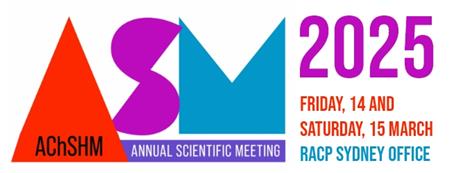
Join us for the 2025 RACP Australasian Chapter of Sexual Health Medicine Annual Scientific Meeting (AChSHM ASM) at the RACP Sydney Office on Saturday, 15 March 2025.
This year’s program will explore a broad spectrum of topics, catering to all sexual health physicians including what’s new in HIV, equity and health, menopause, and Aboriginal, Torres Strait Islander and Māori health and prevention. Hear from our speakers including Dr Nneka Nwokolo, Associate Professor Loren Brener, Dr Catriona Bradshaw, Professor Rebecca Guy and more on all the latest updates within our specialty.
Take advantage of the early bird discount before Friday, 14 February 2025 and register for your opportunity to connect with other sexual health physicians.
We are also extending a special invitation to AChSHM Advanced Trainees to participate in our Annual Trainees’ Meeting (ATM) on Friday, 14 March 2025.
Register now AChSHM ASM & ATM 2025
2025 International Medicine in Addiction Conference
We are thrilled to announce that the biennial International Medicine in Addiction (IMiA) conference is heading to Sydney, Australia next year. Hosted jointly by RACP, RACGP and RANZCP, the IMiA 2025 conference will be held at the International Convention Centre Sydney on 29 to 31 August 2025.
For more information, visit: IMiA | International Medicine in Addiction
2024 Medical Training Survey Results Now Available
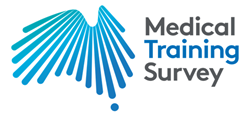
The RACP welcomes the results of the Medical Board of Australia’s sixth annual Medical Training Survey (MTS). This anonymous survey was open between August and October 2024 and was completed by 41 per cent of RACP trainees, including Overseas Trained Physicians who are currently undertaking supervised practice in Australia (n=3,069). Findings point to small but important improvements in key areas such as workload, trainee wellbeing and the provision of safe training environments.
Key findings:
The quality of training and clinical supervision remains high
We continue our work to improve the support we provide to our members who occupy vital supervisory and educational leadership roles. We are also looking to improve our recognition of these roles in 2025.
A need to legitimise and protect teaching and learning time in service delivery contexts
In 2025, the College will be initiating a new Workforce and Healthcare Reform Advocacy program, which will feature increased calls for protected training and education time for members. We’re also looking at our Accreditation Standards to see how these can better support legitimising and protecting educational activities as a core function of accredited training settings.
The importance of safe training environments
We continue our important work to improve the psychological safety of trainees in training settings and we maintain our zero-tolerance stance on unprofessional behaviours. Please refer to our President Jennifer Martin's recent communication on civility and the RACP’s existing support programs.
Trainee wellbeing is critical
Our Member Health and Wellbeing Strategic Plan sets out the College’s aim to improve member wellbeing at both individual and systematic levels. Individual support is free and readily available through the RACP Support Program, along with our range of other services.
Call for clearer communication regarding training requirements
We know we have work to do to meet trainee expectations for quality and timely services. We have invested in new resources for our Member Support Centre and we are launching new technology and processes to support improved training management. We look forward to you all being able to enjoy the benefits of these exciting initiatives in 2025.
Accessing the results
We encourage you to further explore the MTS results via the:
Thank you to all RACP trainees who participated in this important survey.
Further details about the survey can be found on the RACP website and the Medical Training Survey website.
Curious about supervisory experiences in 2024?
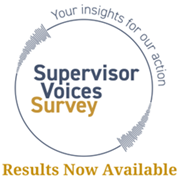
We are pleased to share the results of our 2024 Supervisor Voices Survey. The survey ran over a three-week period in August, and we would like to thank the more than 600 supervisors and educational leaders across Australia and Aotearoa New Zealand who took the time to contribute their voice. The feedback collected provides a solid evidence base to shape the way we support supervisors moving forward.
Key findings
The survey highlighted increasingly heavy supervisory workloads and a pressing need for more dedicated time to fulfill supervisory responsibilities. Despite these challenges, most supervisors still feel they provide high-quality clinical and educational supervision, emphasising their important contribution to training and education.
The results also revealed that supervisors often feel unrecognised for their significant contributions to training, along with persistent concerns around the culture of medicine.
Accessing the results
We encourage you to explore the results through our 2024 Supervisor Voices Survey Summary Report.
How we’re responding
Based on these results, we’re taking the following steps:
- Prioritising advocacy for dedicated time for supervision as a key focus area in our engagement with jurisdictions.
- Enhancing support for supervisors by providing concise resources, timely assistance, and clear role expectations.
- Exploring a formal feedback process to support supervisors’ development.
- Establishing mechanisms to improve recognition of supervisors’ contributions from both the College and workplaces.
- Updating our SPDP program to better meet your needs.
For further information, please visit the Supervisor Voices Survey webpage or reach out to our team at evaluation@racp.edu.au.
The College would like to thank each of our dedicated supervisors and educational leaders for their commitment to the development of their profession, and for their participation in this survey.
Launching the RACP member consultation webpage

The member consultation webpage is your go-to place for all policy and advocacy consultations including contributing to government submissions and College position statements. This will make it easier for you to provide your valuable input to College submissions, to add your voice to drive change, and make a real impact on your profession.
This webpage has been developed based on feedback from the 2023 Member Satisfaction Survey, where many members advised that a single webpage with opportunities to contribute to consultations would support enhanced engagement with policy and advocacy.
To find out how your input to prior College consultations has made a powerful impact, read the College Policy & Advocacy Council’s reports and review approved outputs in the P&A Library.
Find out more.
Check out the new RACP Evolve recommendations on prescribing practice in pharmacology and toxicology (ASCEPT)
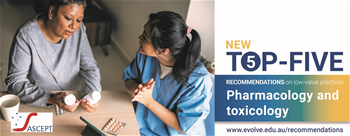
Physicians often prescribe medicines as part of managing complex medical conditions. Both medications and multi-morbidity are becoming increasingly complex.
The Australasian Society of Clinical and Experimental Pharmacologists and Toxicologists (ASCEPT) launched their renewed Evolve Top-5 Recommendations within pharmacology and toxicology that asks clinicians to rethink their prescribing decisions for quality patient care.
Refer to the media release here.
Learn about ASCEPT Evolve Top-5 recommendations here.
Training Management Platform announcement
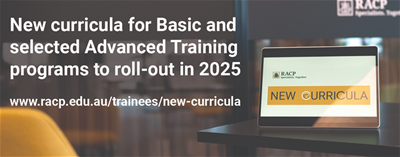
Find out more about our New curricula support hub.
Perioperative Management Toolkit for SGLT2 Inhibitors and GLP-1 Receptor Agonists

The Medicines Advice Initiative Australia (MAIA) has released a new toolkit to support the safe and effective use of SGLT2 inhibitors and GLP-1 receptor agonists (GLP-1RA) in the perioperative period.
About MAIA
MAIA is a consortium dedicated to improving medicine use in Australia, involving leading organisations such as the University of South Australia, Australian Medicines Handbook, and NACCHO.
Toolkit Highlights
- Practice Tool: Resources for Medicines and Therapeutics Advisory Committees to promote safe use of SGLT2 inhibitors and GLP-1RA medicines.
- Teaching Tool: Clinical examples for educators to guide optimal, patient-centred perioperative care.
Key Points for Health Services
- Monitor SGLT2 inhibitor-associated ketoacidosis with point-of-care blood ketone testing.
- Use ‘SGLT2 inhibitor-associated ketoacidosis’ for non-diabetic patients.
- Manage GLP-1RA therapy with evidence-based, patient-centred approaches, and update ‘Sip Til Send’ policies to reflect their use.
- Ensure clear advice on resuming medications at care transitions.
Get Involved
Please share these tools with your networks to enhance safe practices.
For more information, contact Julie Briggs at catag.qum2@outlook.com.
New CATAG Resources to Support Safe Medicine Use

CATAG has launched three new resources to enhance quality use of medicines and support health professionals, Medicines and Therapeutics Advisory Committees (MTCs), and consumers.
1. Consumer Counselling Tool: Changing Brands of Biologics
This plain-English tool helps hospital-based health professionals explain key information about switching biological medicines to consumers. It supports MTCs in implementing the Biologics and Biosimilars Best Practice Guiding Principles.
2. Perioperative Management Toolkit: SGLT2 Inhibitors & GLP-1 Receptor Agonists
This toolkit assists MTCs and hospitals in the safe use of these medicines during the perioperative period. It includes:
- Practice Tool: Guidance for MTCs.
- Teaching Tool: Clinical scenarios to demonstrate optimal, patient-centred care.
Next Steps
- Disseminate these tools within your networks.
- Contribute to CATAG's ongoing projects by sharing local resources on:
- Heart Failure (MAIA project).
- Emerging Therapies (e.g., medicinal cannabis, psilocybin, ketamine – CwC project).
For more information or to submit resources, contact catag.qum2@outlook.com.
Visit www.catag.org.au for details.
TGA product Information safety updates
The TGA recently published a Medicines Safety Update (MSU) article regarding ‘Product Information safety updates – November 2024. It can be found here.
Pharmaceutical Benefits Scheme (PBS) listings
New and amended Pharmaceutical Benefits Scheme (PBS) listings are available here. This information relates to the administration of these listings by Services Australia.
For further information on broader PBS changes, please visit the PBS website

Internal Medicine Journal
The latest issue of the Internal Medicine Journal (IMJ) is now live on the Wiley Online Library and the RACP website (log in using your RACP login credentials). Access articles tweeted on IMJ's Twitter account for free, for a limited time. The easiest way to access the IMJ is via the Wiley Online Library App, find out how you can access it.
Key highlights from the issue are:
- Spectrum of kidney pathology in COVID-19
- Pulmonary arterial hypertension updates
- Organ donation in an ethnic community
- Chronic kidney disease and Vitamin D
- Infective endocarditis outcomes
Read the journal
[Case Report] 47-year-old with rapidly progressive respiratory failure requiring ECMO
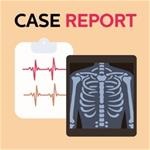
In 2019, a man was referred to Royal Adelaide Hospital with worsening breathlessness and a productive cough. He was a 47-year-old electrician with a history of tobacco smoking who’d been well before the onset of symptoms. Over a couple of admissions, the patient’s condition progressed to type 2 respiratory failure. While the ultimate explanation for this presentation was a bit of a unicorn, the dramatic escalation of examinations and interventions runs through some textbook respiratory medicine; ECMO, infectious diseases, bronchoscopy, CT, interpretation of blood gases and the alveolar gas equation, stenting and ultimately transplantation. This is discussed in the careful manner expected of a long-case presentation in the physician training exams.
Guest
- Dr Thomas Crowhurst FRACP (Northern Adelaide Local Health Network)
Hosts
- Associate Professor Stephen Bacchi (Lyell McEwin Hospital; University of Adelaide)
- Dr Brandon Stretton (Central Adelaide Local Health Network)
Please visit the Pomegranate Health web page for a transcript and supporting references. Login to MyCPD to record listening and reading as a prefilled learning activity. Subscribe to new episode email alerts or search for ‘Pomegranate Health’ in Apple Podcasts, Spotify, Castbox or any podcasting app.
Visit: Pomegranate (racp.edu.au) for the full episode.
You’ve told us that you need your College to be more responsive and supportive. We’ve listened to your feedback and we’re establishing a new Member Support Centre to help you navigate your College, improve enquiry response and resolution times and better support your needs. Thank you for your feedback – it helps us improve.
Update your details with the College
Did you know that you can update your address details online? Simply Login to MyRACP and go to “Edit my details”.
RACP Benefits: Exclusive savings on your lifestyle needs

Did you know that RACP Benefits gives you access to a range of discounts and offers from Australia and Aotearoa New Zealand’s leading brands and retailers? Simply log in to the portal to start shopping and saving today. These special deals are exclusive to the College and made possible by our benefits partner, Member Benefits Australia.
Log in or find out more.
Pomegranate Health podcast: Your contributions welcome
The RACP podcast, Pomegranate Health, has published over 100 episodes since starting out eight years ago.
To provide more frequent and focused content we’re seeking contributions from our speciality societies, committees and affiliated professional organisations.
To hear what this would sound like, listen to the episodes tagged [IMJ On-Air]
These episodes feature authors published in the Internal Medicine Journal being interviewed by the relevant section editor.
They have covered themes as varied as asthma management, hospital-acquired complications, causes of readmission and the JEV outbreak.
You already spend considerable time preparing lectures and webinars for your colleagues. Audio podcasts provide an easy way to reach thousands more around the world. Each episode gets downloaded around 6500 times over the first 12 months from publication, with 21 per cent of listeners located outside of Australia and Aotearoa New Zealand.
All you need to do is to organise one or more presenters and an interviewer familiar with the material. The podcast producer will coordinate an online recording lasting about one hour and then edit it down before publication. The intention would be to ‘brand’ regular episodes from your specialty society or organisation in the same way that we’ve done with [IMJ On-Air].
Please send any questions or ideas to podcast@racp.edu.au
View career opportunities on the RACP website.